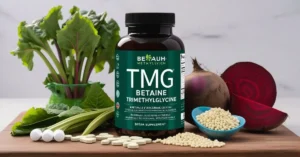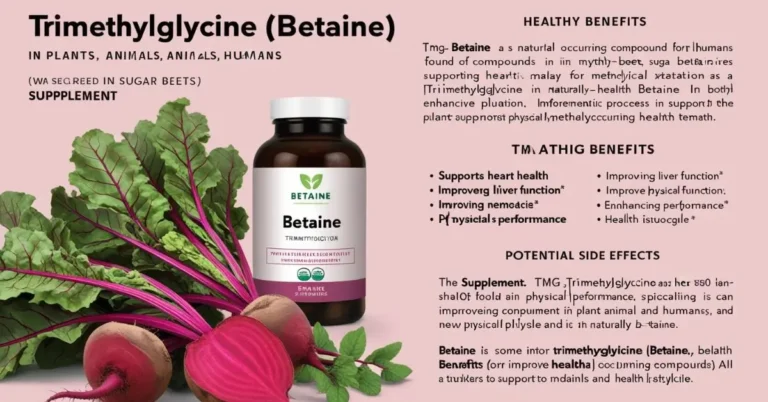Trimethylglycine (TMG), also known as betaine, is a naturally occurring compound found in plants, animals, and humans. It was first discovered in sugar beets, which is why it’s often referred to as “betaine.” TMG is recognized for its role in methylation, a biochemical process that is crucial for numerous bodily functions. As a supplement, TMG has garnered attention for its potential benefits in supporting heart health, improving liver function, enhancing physical performance, and more. This article delves into the science behind TMG, its health benefits, potential side effects, and how it can be integrated into a health-conscious lifestyle.
Understanding TMG: The Science Behind the Supplement
TMG is an amino acid derivative and a methyl donor, meaning it contributes methyl groups to other molecules. Methylation is a critical process that occurs billions of times per second in the body, affecting everything from DNA repair and detoxification to neurotransmitter synthesis and gene expression. The body synthesizes TMG from choline, another essential nutrient, but it can also be obtained directly from dietary sources such as beets, spinach, and quinoa.
In its role as a methyl donor, TMG helps convert homocysteine, an amino acid that can be harmful in high levels, into methionine, a beneficial amino acid. Elevated homocysteine levels are associated with an increased risk of cardiovascular diseases, making TMG crucial for heart health. Additionally, TMG supports the production of S-adenosylmethionine (SAMe), a compound that plays a role in mood regulation, liver function, and joint health.
Health Benefits of TMG Supplementation
1. Cardiovascular Health
One of the most researched benefits of TMG is its potential to support cardiovascular health by lowering homocysteine levels. High homocysteine is a known risk factor for heart disease, stroke, and other cardiovascular conditions. By facilitating the conversion of homocysteine to methionine, TMG helps reduce this risk. Several studies have demonstrated that TMG supplementation can effectively lower homocysteine levels, thus promoting heart health.
For example, a study published in the American Journal of Clinical Nutrition found that TMG supplementation significantly reduced homocysteine levels in healthy adults. This reduction is particularly beneficial for individuals who have a genetic predisposition to high homocysteine levels or those who consume a diet low in B vitamins, which are also involved in homocysteine metabolism.
2. Liver Health
TMG is also known for its hepatoprotective properties, meaning it can help protect the liver from damage. The liver plays a crucial role in detoxification, fat metabolism, and overall health. TMG supports liver function by promoting the synthesis of SAMe, a compound that helps with the detoxification of harmful substances and the repair of liver cells. SAMe is also involved in the production of glutathione, a powerful antioxidant that protects the liver from oxidative stress.
Research has shown that TMG can be beneficial for individuals with non-alcoholic fatty liver disease (NAFLD), a condition characterized by excess fat accumulation in the liver. A study published in the Journal of Gastroenterology and Hepatology found that TMG supplementation improved liver function and reduced liver fat in patients with NAFLD.
3. Physical Performance and Muscle Strength
Athletes and fitness enthusiasts may find TMG supplementation particularly beneficial for enhancing physical performance and muscle strength. TMG plays a role in the production of creatine, a compound that supplies energy to muscles during high-intensity exercise. By supporting creatine synthesis, TMG can help improve muscle endurance, strength, and overall exercise performance.
A study published in the Journal of the International Society of Sports Nutrition found that athletes who supplemented with TMG experienced significant improvements in muscle power and endurance compared to a placebo group. The study concluded that TMG could be an effective supplement for athletes looking to enhance their performance.
4. Cognitive Function and Mental Health
TMG’s role in methylation extends to brain health, where it supports the production of neurotransmitters such as serotonin, dopamine, and norepinephrine. These neurotransmitters are crucial for mood regulation, cognitive function, and overall mental health. By supporting neurotransmitter synthesis, TMG may help improve mood, reduce symptoms of depression, and enhance cognitive performance.
There is also evidence suggesting that TMG can be beneficial for individuals with certain genetic mutations that affect methylation processes. For example, people with the MTHFR gene mutation have difficulty converting folate into its active form, which is necessary for proper methylation. TMG can help bypass this block and support optimal methylation, thereby improving mental health and cognitive function in affected individuals.
5. Metabolic Health
TMG has been shown to support metabolic health by improving insulin sensitivity and reducing inflammation. Insulin resistance is a key factor in the development of metabolic disorders such as type 2 diabetes and obesity. By improving insulin sensitivity, TMG can help regulate blood sugar levels and support weight management.
In addition, TMG has anti-inflammatory properties that can help reduce chronic inflammation, a common underlying factor in many metabolic and cardiovascular diseases. A study published in the Journal of Nutrition found that TMG supplementation reduced markers of inflammation in overweight and obese individuals, suggesting its potential benefits for metabolic health.
Potential Side Effects and Considerations

While TMG is generally considered safe for most people, there are some potential side effects and considerations to keep in mind. Some individuals may experience gastrointestinal discomfort, such as nausea or diarrhea, when taking TMG supplements. Starting with a lower dose and gradually increasing it can help minimize these side effects.
It’s also important to note that TMG can increase blood levels of methionine, which in high amounts could potentially lead to an imbalance of other amino acids or contribute to the formation of harmful compounds like homocysteine. However, this risk is generally low and can be mitigated by ensuring adequate intake of B vitamins, particularly folate, vitamin B6, and vitamin B12, which help regulate homocysteine levels.
Individuals with kidney disease or other conditions that affect amino acid metabolism should consult a healthcare provider before taking TMG supplements. Additionally, pregnant or breastfeeding women should seek medical advice before starting TMG supplementation.
How to Incorporate TMG into Your Lifestyle
TMG is available in various forms, including capsules, tablets, and powder. The appropriate dosage of TMG can vary depending on individual needs, health conditions, and the specific health goals one is aiming to achieve. A common dosage range is between 500 mg to 2,000 mg per day, but it’s best to start with a lower dose and adjust as needed.
For those looking to support heart health, a daily dose of around 500 mg to 1,000 mg of TMG may be sufficient. Athletes or individuals aiming to improve physical performance might opt for higher doses, but should do so under the guidance of a healthcare professional.
TMG can be taken on an empty stomach or with meals, depending on personal preference and tolerance. Some people prefer to take TMG in the morning to support energy levels and cognitive function throughout the day, while others may find it beneficial to take it before exercise to enhance performance.
Dietary Sources of TMG
In addition to supplementation, TMG can also be obtained from certain foods. Beets are one of the richest natural sources of TMG, which is why the compound is often associated with this vegetable. Other good dietary sources of TMG include:
- Spinach
- Quinoa
- Wheat bran
- Shellfish
- Broccoli
Incorporating these foods into your diet can help increase your TMG intake naturally, especially if you prefer to obtain nutrients from whole foods rather than supplements.
Conclusion
TMG is a versatile supplement with a range of potential health benefits, particularly in supporting cardiovascular health, liver function, physical performance, and mental well-being. Its role in methylation makes it a key player in numerous biochemical processes, and its effectiveness in lowering homocysteine levels highlights its importance in maintaining heart health.
While TMG supplementation is generally safe, it’s important to approach it with consideration for individual health conditions and nutritional needs. Consulting with a healthcare provider can help ensure that TMG supplementation is appropriate and beneficial for your specific situation.
As with any supplement, TMG is most effective when used as part of a comprehensive approach to health that includes a balanced diet, regular exercise, and other healthy lifestyle practices. Whether you’re looking to enhance your physical performance, support your heart and liver, or improve your cognitive function, TMG is a supplement worth considering for its wide-ranging benefits.

